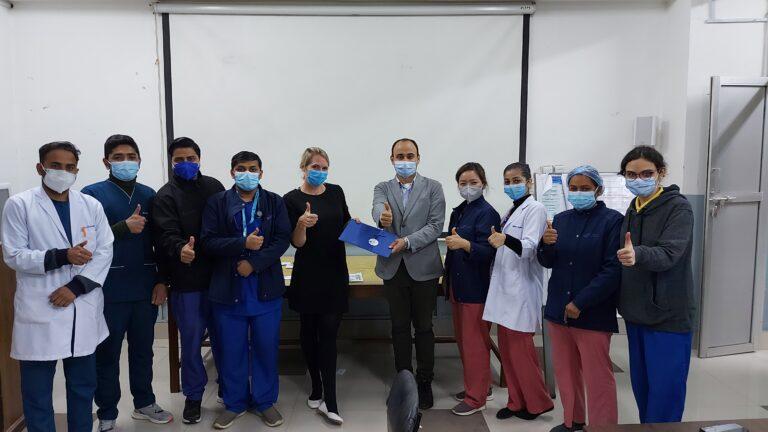Our first workshop on stroke care was a great success! Thanks to the enthusiasm and motivation of the newly built stroke team in Chitwan Medical College!
After months of preparation and despite all (Covid-related) obstacles, we were really glad to perform our first stroke-care workshop here in Chitwan Medical College (CMC). CMC is a large, multidisciplinary teaching hospital with a large catchment area, located approximately 100 km south of Kathmandu. Stroke care for the estimated 50 patients/month has so far only been provided at an essential level. According to the health team, this is due to the lack of protocols (for acute stroke care, imaging and post-acute care) and a dedicated “stroke team”. Recanalization has not been performed before, partly because most patients come far outside any time window and often cannot afford the treatment. The great advantage of the hospital is not only the ambitious team, but also the availability of all necessary facilities and the support of the hospital board and Dr. Harish Neupane in becoming a stroke center.
On two afternoons we worked on the following topics in a group with 20 participants from different departments (Dept of Nursery, Internal Med, Cardiology, Anesthesia, Radiology, Psychiatry, Physiotherapy):
To make stroke care as simple as possible, we distributed the checklists designed by the Angels’ Initiative in a slightly adapted form, which was welcomed as very helpful by the participants. These checklists and flowcharts serve not only as a standardized protocol – from patient arrival to discharge – but they also serve to monitor key performance indicators of stroke care. The participants were always challenged to actively shape the workshop: They had to practice the NIHSS score – some acting patients, some examining; assessed images and made decisions in case studies; worked out in small groups the optimized procedure in the emergency room. And finally, in simulations fabulous door-to-imaging and door-to-therapy times were achieved. Thanks to the great organization of Dr. Pradesh, there was plenty of delicious chai, sweets and traditional Nepalese lunch.
And now? It’s time to integrate the whole thing into everyday clinical practice – and we are looking forward to hearing the success stories that the participants will report at our follow-up meeting in March.
